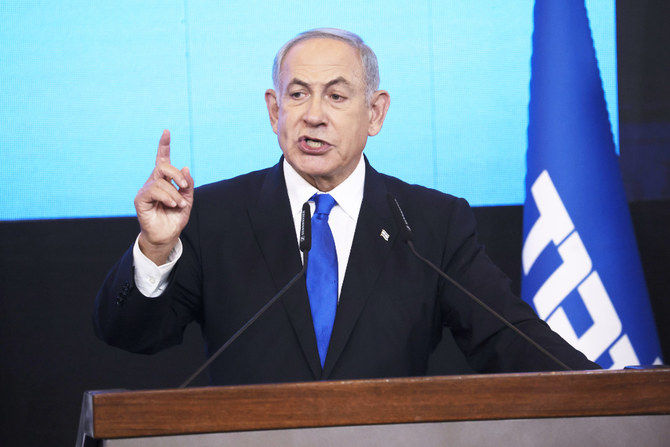RAMALLAH: Washington has informed Tel Aviv that it will not grant entry visas to the US for Israeli security personnel or settlers who engage in violence in the West Bank, according to Israeli sources.
The US also indicated it may reduce its military aid to Israel, or may not grant annual guarantees for $33 billion in assistance for the next 10 years, if used against Palestinians in the West Bank.
This development coincided with incoming Israeli Prime Minister Benjamin Netanyahu announcing success in forming a new government.
Washington has sent warning messages to Netanyahu through its ambassador to Israel, Tom Nides, in the wake of the success of right-wing Israeli parties in elections in early November.
The US identified red lines that President Joe Biden will not allow to be crossed, including Israel taking unilateral steps to undermine the two-state solution, and changing the status quo of Al-Aqsa Mosque in Jerusalem.
Israeli political analyst Yoni Ben Menachem told Arab News that the Netanyahu government is obliged to abide by the US requests because it needs weapons from Washington for military operations in Iran.
Netanyahu “will not enter into a confrontation with Biden because he needs to obtain this American weapon, and he informed both (coalition partners Itamar) Ben-Gvir and (Bezalel) Smotrich of this,” Ben Menachem told Arab News.
The analyst indicated that Biden does not want a confrontation with Netanyahu as it would strengthen extremists in the incoming government, undermine the Palestinian Authority and the two-state solution
Palestinian political analyst Ghassan Al-Khatib told Arab News that the composition of the new Israeli government constituted a challenge and embarrassment to the Biden administration.
He said the president would pressure Netanyahu to curb those far-right elements in his coalition, which, Al-Khatib said, would also be in the interests of the new prime minister, so as to lessen their influence over him.
Netanyahu has for some time pursued a strategy of exaggerating the Iranian threat to the region in order to entice more Arab countries to normalize relations with Israel and to obtain advanced American weapons, as well as using that threat domestically to imply an existential threat against Israel.
But he is struggling to promote the idea whilst simultaneously claiming the Palestinian Authority poses an equally existential threat.
The PA, meanwhile, may benefit from US pressure on Israel and the presence of extreme right-wing elements in government to revitalize its own efforts to improve relations with international organizations and European countries.
In another development, Palestinians sources say the Jewish shrine of Joseph’s Tomb, located in the center of Nablus beside the Balata refugee camp, has become a hotbed of tension and violence.
The frequent storming of the site by dozens of religious settlers, protected by the Israel Defense Force, often leads to stone-thowing or armed confrontations between Palestinians, settlers and the IDF.
The number of Palestinians killed at the site since the beginning of the year is estimated at 20, the latest of whom was soccer player Ahmed Daraghmeh, who died on Wednesday night in an incident that saw 22 others injured when Palestinian militants exchanged fire with Israeli troops escorting Jewish worshippers to the tomb in the Palestinian city.
Palestinian sources say incursions increased after Netanyahu and his allies performed well in the polls in November, and that settlers stoke tensions by posting photos and videos upon their arrival at the shrine on social media.
A high-ranking Palestinian security officer in Nablus, who preferred not to be named, told Arab News that the IDF and settlers’ repeated incursions into the area often occurred without prior official coordination with the Palestinian security services, instead making announcements in advance through Israeli social media and official settler webpages.
Loud music, dancing, screaming and partying are common when they arrive, said the Palestinian officer, adding that settlers often set up tables laden with food at the shrine. “This is a provocative act, not a prayer,” he added.
The official said that before, visits were limited to once a month during daylight hours, when Palestinians in the area tended to be at work or school, but that they now take place more often and usually at night, with increasingly provocative, far-right overtones.
The visits cause an increase in the security burden and widespread embarrassment for the Palestinian security services, as every visit to the shrine ends with violence and, increasingly, the killing and wounding of Palestinians.
“Palestinian citizens are wondering where the Palestinian security is to protect us from the oppression of the army and the storming settlers. But, according to the agreements with the Israeli side, we cannot engage in armed clashes with the Israeli army, which harms the image and prestige of the Palestinian security forces in the eyes of its people,” the source told Arab News.
He described the shrine as having become one of the most bloody and tense points between the Palestinians, the IDF and the Israeli settlers in the West Bank, second only to Al-Aqsa Mosque.
Palestinian police guard the tomb around the clock, but withdraw when the IDF and settlers arrive to visit the site.
An Israeli source told Arab News that the clashes at Joseph’s Tomb were due to the weakness of the Palestinian security services in Nablus, which no longer control the city.


























